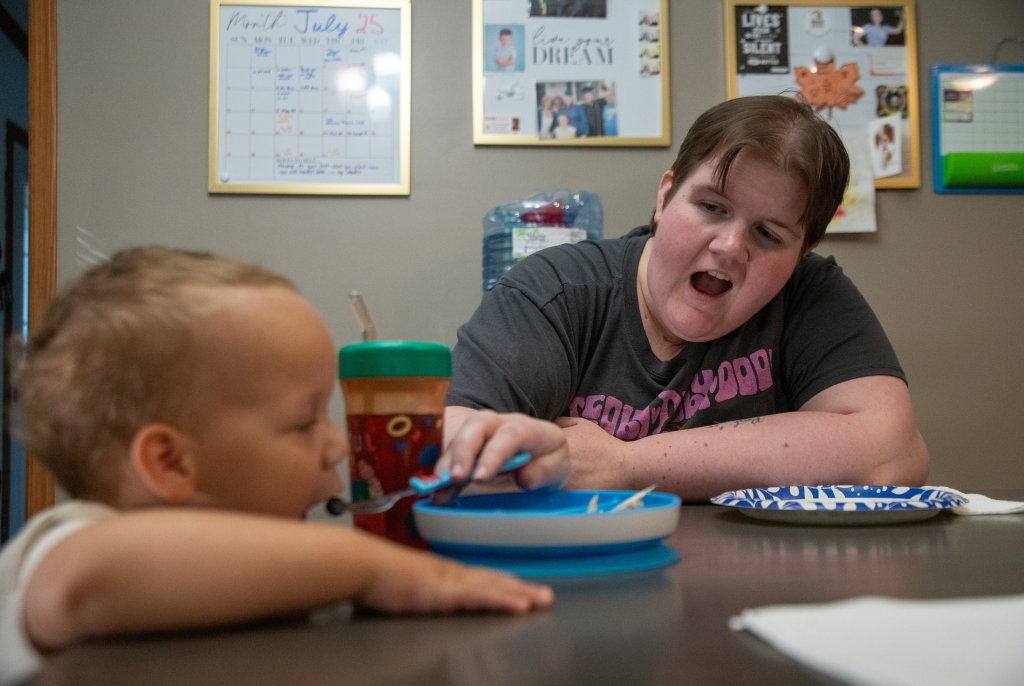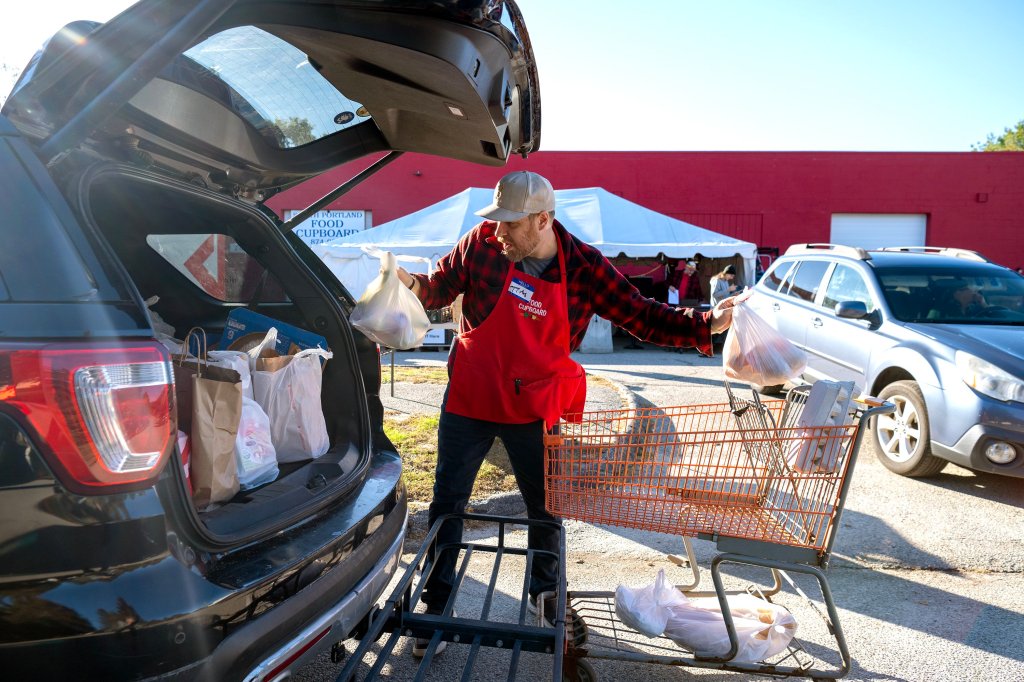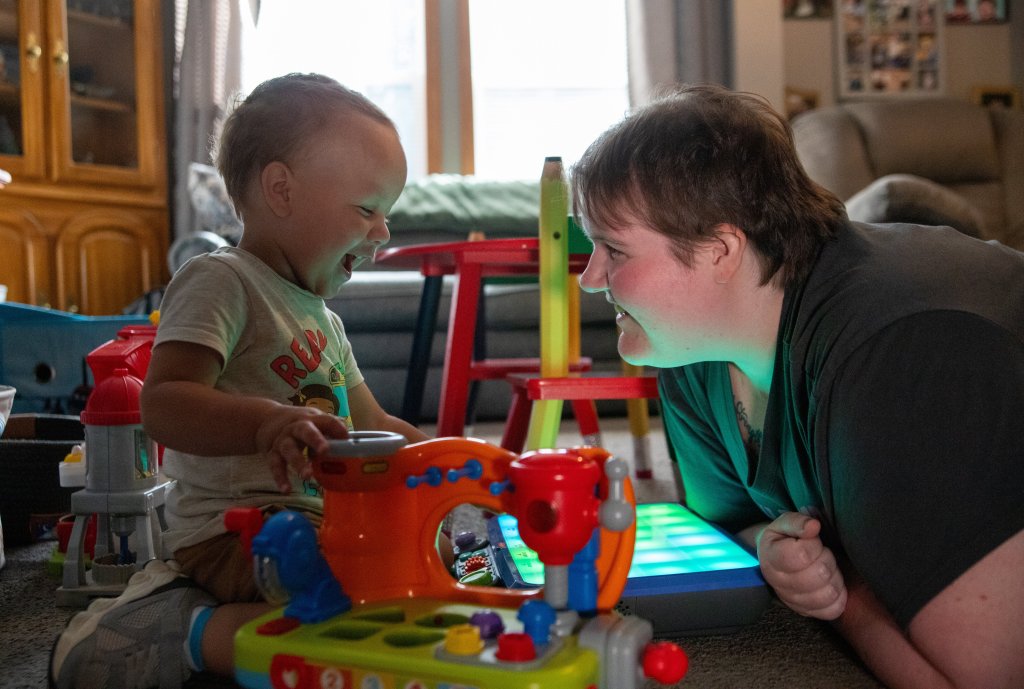
Megan Newsome checked online this week to see how much she should expect to receive in benefits from the Supplemental Nutrition Assistance Program (SNAP) in November.
She saw a zero.
Maine officials announced on Tuesday that the federal government has warned them that it is not distributing SNAP benefits to states next month because of the ongoing government shutdown.
So families like Newsome’s — who receive hundreds of dollars per month to help pay for groceries — will receive no SNAP money in November, unless the decision is reversed.
“I’m really freaking out about how I’m going to feed me, my family, my son,” said Newsome, 29, of Lisbon. “We really rely on this for food in everyday life.”
A single mother and full-time student, Newsome receives about $400 a month to feed herself and her 2-year-old son.
Newsome said she may have to rely on a food pantry to make ends meet.
“They’re taking (SNAP) away during the month of Thanksgiving,” Newsome said. She hopes to get a turkey and side dishes from the food pantry if SNAP benefits remain unavailable.
The average monthly SNAP benefit for a family of four in Maine is $572. Forty-two million Americans use SNAP, including 169,812 Mainers — 12.5% of the state’s population — according to the Maine Department of Health and Human Services.

‘PEOPLE IN MAINE WILL GO HUNGRY’
Heather Paquette, president of the Good Shepherd Food Bank of Maine, which distributes food to 250 community food pantries and 175 school-based food pantries statewide, said the impact of the SNAP cuts will be “shocking.”
Paquette expects pantries will be overrun with demand in November, and that they may have to make really difficult choices, such as limiting the number of times a family can go to a food pantry per week or restricting who each pantry serves based on geography.
“Losing these SNAP benefits will mean people in Maine will go hungry,” Paquette said. “Our work is designed to be the last resort, used after all other safety-net measures have been exhausted.”
Gov. Janet Mills said in a written statement Tuesday that “benefits are at risk because the Trump administration and Republicans in Congress have shut down the government instead of agreeing to extend the health care tax credits on which so many families depend to pay for their health insurance.”
Both parties have blamed each other for the shutdown, which began on Oct. 1 over funding disputes in Congress. One of the major sticking points is whether to extend Affordable Care Act subsidies that are set to end on Dec. 31. If the subsidies are not extended, premiums for many people on the ACA marketplace will soar.
Agriculture Secretary Brooke Rollins blamed congressional Democrats for the shutdown and the interruption of SNAP benefits.
“You’re talking about millions and millions of vulnerable families, of hungry families, that are not going to have access to these programs because of this shutdown,” Rollins told reporters in Washington last week. “It is time to open the government back up and serve the American people.”

SNAP has $6 billion in contingency funding but needs $8 billion to cover benefits nationally for November, according to Trump administration officials. U.S. Rep. Chellie Pingree, D-1st District, said the administration could shift funds to cover the shortfall.
Pingree pointed out that during past shutdowns — including in 2019, when the government was shut down for 35 days — SNAP benefits continued. She suggested that the halt to SNAP benefits is a ploy by Republicans to pressure Democrats.
“There’s no reason to do this,” Pingree said. “(Trump officials) are trying to strike fear into the hearts of Americans who are already worried about the high cost of food. I am appalled that they would do this.”
TIGHTENING BUDGETS EVEN FURTHER
SNAP is also undergoing record cuts stemming from the One Big Beautiful Bill that Republicans passed in July.
Paquette said food pantries are already experiencing heightened demand — likely prompted by SNAP cutbacks and increasing grocery prices — with some seeing a 50% rise in families seeking food.
James Myall, a policy analyst for the Maine Center for Economic Policy, a left-leaning think tank, said eliminating the November benefits will harm the economy, as research cited by the Food Research and Action Center shows $1 in SNAP spending generates $1.50 in economic activity.
“This is going to mean less spending at grocery stores, but also less spending elsewhere, as SNAP families cut elsewhere to find the money to put food on the table,” Myall said. “People are going to put off getting their hair cut or buying new snow tires, and that ripples through the economy.”
Kasey McBlais, a single mother of two in Buckfield, said losing SNAP benefits will force her to make hard decisions regarding her family budget.
“I’ll have to definitely get tighter with my budget,” she said. “I don’t know how much more tight we can get.”
McBlais receives about $600 a month from SNAP for her family of three. Without the assistance, she said her children may have to start eating breakfast at school. She plans to be more strategic with meal planning and only buy what’s on sale.
But even if she falls behind on her other bills, she will make sure her children eat.
“My children won’t go hungry,” McBlais said. “I’ll do whatever I can. I will feed them. I will cut corners in other places if I need to.”


We invite you to add your comments. We encourage a thoughtful exchange of ideas and information on this website. By joining the conversation, you are agreeing to our commenting policy and terms of use. More information is found on our FAQs. You can modify your screen name here.
Comments are managed by our staff during regular business hours Monday through Friday as well as limited hours on Saturday and Sunday. Comments held for moderation outside of those hours may take longer to approve.
Join the Conversation
Please sign into your CentralMaine.com account to participate in conversations below. If you do not have an account, you can register or subscribe. Questions? Please see our FAQs.